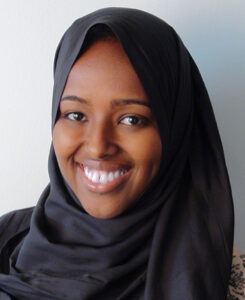Meet Our Researchers: Fadumo Abdi
Author
 Fadumo Abdi is a senior research analyst at Child Trends. Fadumo’s projects focus on the well-being of systems-involved, transition-aged youth, including the Annie E. Casey Foundation’s Young Adult Developmental Framework and the Virginia Department of Juvenile Justice’s Second Chance Act Reentry Reform evaluation. She is currently project director and implementation evaluation lead for the Prepare Evaluation, a reentry program for previously incarcerated fathers, and the point person for the KIDSCOUNT indicators annual updates.
Fadumo Abdi is a senior research analyst at Child Trends. Fadumo’s projects focus on the well-being of systems-involved, transition-aged youth, including the Annie E. Casey Foundation’s Young Adult Developmental Framework and the Virginia Department of Juvenile Justice’s Second Chance Act Reentry Reform evaluation. She is currently project director and implementation evaluation lead for the Prepare Evaluation, a reentry program for previously incarcerated fathers, and the point person for the KIDSCOUNT indicators annual updates.
Can you tell us about your primary research interest(s)?
My primary research interests are the well-being of youth as they transition into adulthood, with a specific focus on their mental health and the impacts of inequity on their outcomes as they advance through life. In line with this interest, I’ve focused on projects that allow me to participate in evaluations of youth-serving programs and to conduct research on the mental health of youth whose lives intersect multiple systems—such as those young people who are involved in both the child welfare and the juvenile justice systems.
What sparked your interest in how mental health and inequity affect children and youth’s outcomes”?
I’ve always been interested in the ways in which mental health, well-being, and experiences of inequity influence an individual’s outcomes throughout their life course. At Child Trends, and within the youth development program area, I’ve been able to work on a number of projects that focus on youth and how they interact with the systems that ostensibly serve them. These opportunities have shaped and narrowed my interests toward explorations of youth well-being.
What books or journal articles have most influenced you?
Jason DeParle’s American Dream: Three Women, Ten Kids, and a Nation’s Drive to End Welfare and Evicted: Poverty and Profit in the American City by Mathew Desmond have been significant in shaping my understanding of the inequitable history of poverty policies and their long-term effects on individuals and families through the life course.
What are your hobbies or interests outside of research?
Since the start of COVID, I’ve been able to do a lot more reading than at any time since starting my undergrad, and I’ve joined some book clubs. To make up for lost time, I’ve been reading some of the major of works of authors whose work I’ve only heard about in popular culture. I am starting with the works of Nurradin Farah and Toni Morrison.
To wrap up, can you tell us a fun or interesting fact about yourself or your family?
If I was not in the world of research, I think I would be a clinical psychologist. The research track, though, has provided me the opportunity to take a public and global focus—and hopefully a wider impact—on well-being.
© Copyright 2024 ChildTrendsPrivacy Statement
Newsletter SignupLinkedInThreadsYouTube